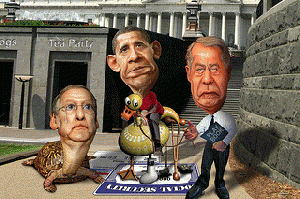Riding the Lame Duck to the Fiscal Cliff by DonkeyHotey
Usually, I'm pretty critical of the present-day Republicans, who are, in my estimation, not really representative of the true Grand Old Party, of which I was once a member. But my criticism of them, shouldn't be interpreted as a blanket approval of Mr. Obama and the Democrats.
First, an erroneous claim; Mr. Obama is a socialist. If you consider his continuation of Bush's policies, he's barely left of center. He's as much a corporatist as any president since Eisenhower, who warned us not to trust the military industrial complex. For those not familiar with the word corporatist, it's a system of government using the power of organizations such as businesses and labor unions that act, or claim to act, for large numbers of people. And what do these organizations possess? Money; the real grease that lubricates the machinery of American politics.
If Mr. Obama were really a socialist, healthcare would be a government run, single-payer system for everyone. In fact, the Affordable Care Act (Obamacare) is a gift to the healthcare insurance industry. They will enjoy approximately 30 million new customers by fiat. And don't forget, they are for-profit corporations who consider the cost of the service they provide to be an expense. And an expense is anathema to any profit making organization. Think about how counter-intuitive this is. Doesn't the fact the insurance industry considers its primary product to be an expense bother you a little?
Then there's the banking industry that is still using the same strategies and tactics that brought us to the brink in 2008. Wouldn't they be a good target for "hope and change?" Yet they continue as though nothing happened. Many American's lost their life savings with no way of ever recovering them. The banking executives who caused this misery are back to earning enormous salaries and bonuses at pre-2008 levels, as though nothing happened. And to this date, not one criminal indictment has been issued.
Ever wonder why? New York Times, Economist, Paul Krugman had an interesting take in his column in the July 11th, 2012 issue about with regard to Mitt Romney's unwillingness to disclose much about his finances, "To the extent that Mr. Romney has a coherent policy agenda, it involves cutting tax rates on the very rich -- which are already, as I said, down by about half since his father's time. Surely a man advocating such policies has a special obligation to level with voters about the extent to which he would personally benefit from the policies he advocates. Yet obviously that's something Mr. Romney doesn't want to do. And unless he does reveal the truth about his investments, we can only assume that he's hiding something seriously damaging."
But an even more relevant observation was a response to that column by a reader named Joe from Ann Arbor, Michigan. Joe wrote, "It is this lack of not knowing the "real" Obama that, perhaps a politically effective strategy, annoys liberals and inspires phobia in conservatives. We see this so clearly here, in the case of Obama not being able to pursue an obvious line of attack because of his own ambivalent relationship with, in the words of FDR, "the money powers."
In effect, money has become so powerful as to obscure the real character of any politician. If we took money out of the equation and saw the real people behind their faà �ade, what would we see?
I'm afraid we'd see politicians who are remarkably similar. People with fungible ethics. People who can reflect the preferred image of their bases. People who are straining to attract the moderates and independents, while keeping the extremes in their parties satisfied. People who realize that politics is the art of the possible and they need to be in office to play the game. And finally people who will say what they need to say to get there.
No politician can get to the top without playing politics. And politics is like any human endeavor, the ones at the top are the best players.
Politics requires a propensity for rationalizing: the dictionary defines it as "to attempt to justify behavior normally considered irrational or unacceptable by offering an apparently reasonable explanation." Sound familiar?
Robert DeFilippis






